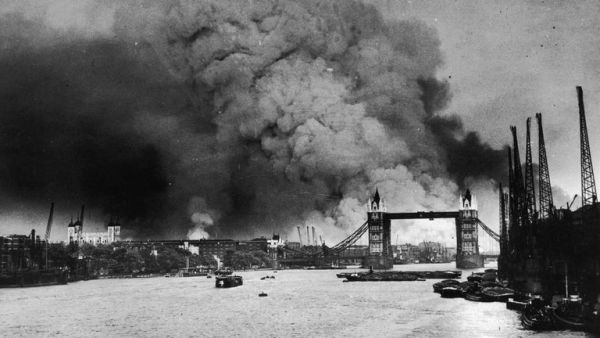 Excerpted from Our Neighborhood, a new RWC quarterly publication)
Excerpted from Our Neighborhood, a new RWC quarterly publication)
By Milena Van Sant
I lived as a child and young teen under the iron fists of two dictatorships – the Nazis in Germany and Austria, and Soviet Communism in what is now Czechia.
I was born in 1937 in Berlin. Even we, the children, could not miss seeing enormous photographs of Hitler proliferating next to supersized swastika flags rippling in the wind. Black-clad men marched briskly through the streets, throwing their legs high like puppets on a string.
Cheering crowds watched, but in time more and more people would shrink into stores for safety, until these same stores bore the signs of “Don’t buy from Jews!” and ceased to exist. Hitler’s shrill voice set to its highest volume attempted to drown out all reason as he proclaimed that he alone could save us from all enemies, whether real or imaginary. My Estonian-born father passed as being of a superior race, presumably because of its large German population.
After a steady denial of the evil of which the Third Reich was fully capable and some futile and tragic attempts at appeasement by an unbelieving world, British bombers began retaliating against the Nazi Blitz bombings of London.
In the summer of 1940 nightly raids announced by shrilling warning sirens brought our parents rushing to our bedside to remove our limp, sleepy bodies from the warm covers to take us to a bomb shelter or a dank, dark apartment house basement. The loud noise temporarily overcame Hitler’s un-hinged, bombastic speeches but we, the children, pondered uneasily if we had misbehaved to cause the calamity of a possible death upon us as punishment.
We moved to the Austrian capital of Vienna for safety. The old manicured former royal palace gardens had be-come the neighborhood playground, and I felt like a child again. We lived in a 15-room apartment where my room became a bit of Paradise with its pink furniture and painted wooden plaques depicting fairy tale characters hanging on the walls. Our housekeeper pre-pared dumplings with a sweet surprise fruit inside, but she would later threaten to report my parents to the Nazi authorities for secretly listening to strictly for-bidden Radio Free Europe broadcasts from London. The Nazis only transmitted falsehoods to fit their purpose.
Austria had become fully incorporated into the Third Reich. Some playmates began wearing yellow stars on their outer clothing, as did their par-ents. At the time I would not know that they were marked with the Hebrew Star of David and become publicly targeted for death. Slowly, they disappeared from my circle of friends. I admired the stars and asked my parents if I could have one of my own. My mother cried out, “My God, no!” and burst into tears. She could not give an explanation. A child’s questions could not often be answered.
We children instinctively knew that bad things were happening all around us, but did not understand what they were or why they existed. Many, many years later I woke up one night with the nagging thought that the luxurious apartment in Vienna had been made available to us because a Jewish family had been carted off to a concentration camp for forced labor until they were emaciated and died. It is one of the sharp creases etched into the crumpled paper of my memory.
When Allied bomber planes be-came capable of reaching Vienna from conquered Fascist Italy’s air bases in 1942, we sought refuge in a small village in the foothills of the Austrian Alps. A large lake, snowdrops poking through the frost, ripening blueberries, mushrooms and hazelnuts and glistening rainbow trout passing in quicksilver mountain brooks gifted me with another glimpse of what childhood was meant to be. We had kept our Vienna apartment until we received news that a time delay bomb had demolished my room and much of the other chambers along with their contents. I saw dust and rubble and learned the valuable lesson of the fleeting value of objects. Of the wooden plaques – only Cinderella partially survived.
We were liberated in the Alpine village by American soldiers. Their precious young years were shortened or destroyed by the bloody war. We will never forget their sacrifices. And so The “War to End All Wars” ended in September of 1945.
In November of 1945 we made the fateful decision to move to Prague. The ancient city flourished as the yoke of Nazi rule had been broken. Musicians emerged to play in public places. Cultural life proliferated. After many years of subjugation Czech freedom had asserted itself, the people rejoiced, and we children peacefully resumed our play in the cobbled streets and lush parks. It was not to last.
In February of 1948 the country would become a satellite of the Soviet Union by a majority vote electing the communist ideology of powerful Slav brother Russia. Czech Communists did not kill children – they recruited and groomed us to become fervent followers by promising a glorious future for us and our county. It was a heady feeling for a ten-year old child. Instead, the autocratic boot came down on our fathers who were in opposition, many of whom disappeared forever. In the illogical ways of despotic regimes my father was accepted as “desirable” _for having lived in Russia and speaking the language. It did not take long before he became an “Enemy of the State” and was taken for questioning by the SNB (equivalent of the Gestapo). The agents who took him into custody made it clear that there existed a dossier on our family – including my 12-year-old self for failure to have participated in patriotic May Day parades.
My father’s transgression? Exchanging business letters with an associate in the Netherlands. My mother was declared an “Enemy of the State” for openly criticizing the regime.
Father returned, shaken, later that day and after a year-long negotiation we were able to obtain an exit visa for Germany. Our little family, now displaced persons, were welcomed into a DP camp underwritten by American taxpayers to offer temporary shelter until we were able to support ourselves. No words will ever adequately express my gratitude. We lived a schizophrenic life, but we lived. Millions were not so fortunate.
